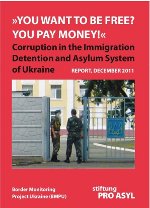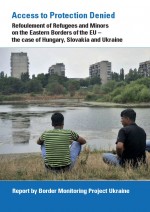Almost three month after the Hunger Strike ended, the Somalis (and others) are still in detention. Although all of the Somalis got a document saying that they are in asylum procedure, they are still detained. Only some of them, who “finshed their 12 month” were released. Currently, 105 persons (out of them 45 Somalis) are still detained in Volyn Detention Center.
The particpants of the “Transborder conference”, which took place from the 15th – 18th March in Istanbul sent a gereeting to them:
We, the people at the Transborder conference in Istanbul March 15th – 18th, extend our support and solidarity to Somalis detained illegally and unjustly in Lutsk and Chernigiv prisons. We support your courageous hunger strike and we support your struggle for freedom, the right to residence permits and an end to police extortion, harassment and repeated arrests of asylum seekers in Ukraine. Keep up your courage and determination, we are with you and will continue to be with you until you are all released.
Signitures:
All Included Amsterdam (Netherlands), Afrique Europe Interact (Transnational), Infomobile (Transnational), Welcome to Europe (Transnational), Solidarity with migrants group (Bulgaria), Zoltán Somogyvári (Hungary), Stifung :do (Germany), Aracem (Mali), Marmite aux idées (France), Pro Asyl (Germany), Lilla Zentai (Hungary), Natasha King (UK), ABCDS (Morocco), Bordermonitoring.eu, No Borders Project – Social Action Centre (Ukraine), CAMZ (Ukraine), Fasti (France), Femmes en lutte (France), Sabine Eckart – Medico International (Germany), Borderline.europe (Germany), Network of Social Support to Immigrants and Refugees (Greece), Network for Social and Political Rights (Greece), Forum tunisien des droits économiques et sociaux (Tunesia), Migreurop (France), Migrant Solidarity Network Istanbul (Turkey), Committee to support Somalis in Lutsk and Chernigiv detention centres (Transnational)
Furhtermore, Barbara Lochbihler (chair of the Subcommittee on Human Rights of the European Parliament) sent an official request to the European Commission:
At present, the International Organisation for Migration (IOM) is running the SIREADA project in Ukraine, with backing of almost EUR 2.4 million from the European Union and the Austrian Ministry of the Interior. The declared aim of this project is to provide ‘Humanitarian assistance for migrant detainees in Moldova and Ukraine’. In addition, the International Centre for Migration Policy Development (ICMPD) carried out the ERIT project, which was funded by the European Union to the tune of EUR 1.75 million. The ICMPD has written the following about the project: ‘Technical support in the amount of 140 thousand Euro has been recently provided to two detention centres in Rozsudiv (Chernigov oblast) and Zhuravichi (Volyn oblast) under the GDISC ERIT project. That was in addition to substantial financial assistance of the EU to the Ministry of Internal Affairs of Ukraine for actual establishment of those facilities in 2008.’ According to statements by the UNHCR, Human Rights Watch, Amnesty International and the Ukrainian Refugee Council, Somali refugees went on hunger strike in the Rozsudiv (Chernigov oblast) and Zhuravichi (Volyn oblast) detention centres at the beginning of 2012 in an effort to draw attention to their situation. There are also reports of a violent attack on the hunger-strikers by members of the Ukrainian security forces on 30 January 2012. The UNHCR has cited a potential breach of Article 5 ECHR with regard to the detention of the Somali refugees.
1. What information does the Vice-President/High Representative have regarding the detention of Somali refugees in the aforementioned centres and the resulting hunger strike?
2. How does the Vice-President/High Representative assess the UNHCR’s suggestion that the detention of Somali refugees represents a potential breach of Article 5 ECHR?
3. How does the Vice-President/High Representative assess the efforts made by the IOM and ICMPD to provide support for the establishment and operation of the aforementioned centres? Does the Commission take the view that the aforementioned projects are/were genuinely capable of reducing or preventing human rights violations in relation to the detention of Somali refugees in Ukraine?
4. How does the Vice-President/High Representative ensure that the widespread corruption involving migration and asylum officials in Ukraine, as documented by organisations such as Human Rights Watch(1) or the Border Monitoring Project Ukraine(2), does not affect the projects funded by the European Union?
(1) Vgl. http://www.hrw.org/sites/default/files/reports/ukraine1210WebVersion.pdf (2) Vgl. http://bordermonitoring-ukraine.eu/files/2012/01/corruption.pdf
Untill now the European Commission did not answer these questions. When we receive answers, we will publish them on this website.



